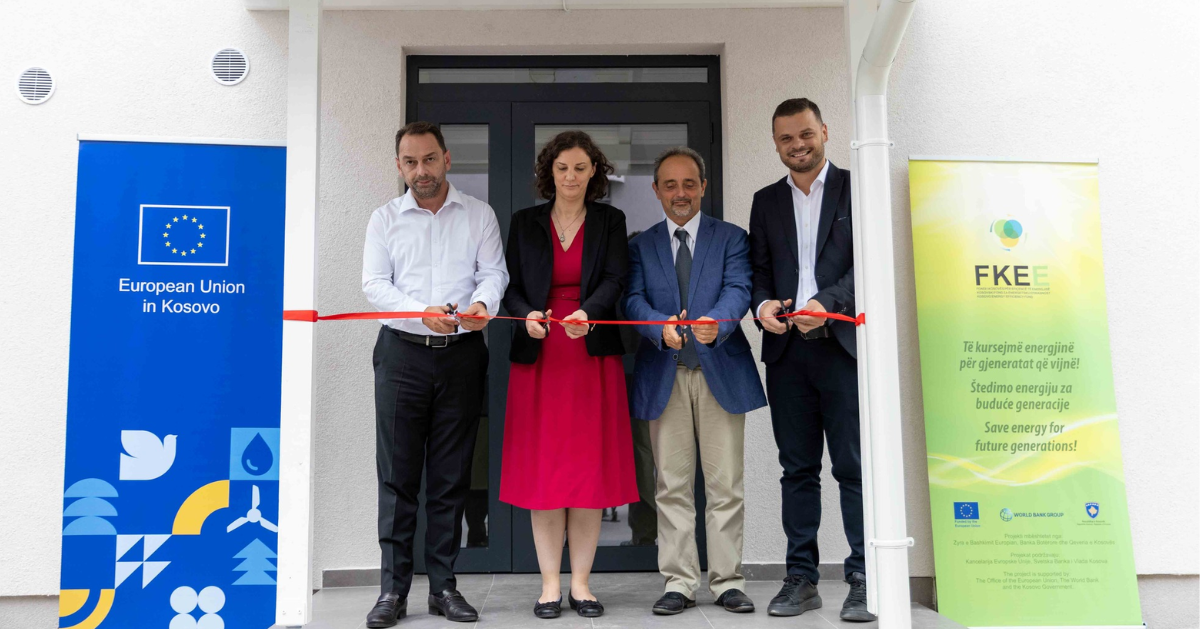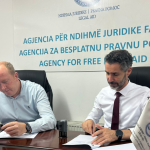Warmer, cheaper, more comfortable. That’s how 100 families living in social housing in Skenderaj can now look forward to the winter.
“Even before winter came, we noticed it was warmer. On colder days, we could feel the difference. And in summer, it’s cooler inside now because they installed the climate system,” says Bajram Shatri, one of 100 heads of households in three social housing buildings where energy efficiency works were inaugurated on Tuesday.
This €700,000 investment is part of the European Union (EU)-funded Energy Support Package, implemented by the Kosovo Energy Efficiency Fund (KEEF). The investment covered insulation, new windows and doors, heating and ventilation systems, lighting, and renovation of common areas. It is seen as a step toward the green transition, significantly reducing electricity consumption.

“I am extremely proud of not only of this project but of all the actions that were foreseen under the energy support package. It was a big challenge, let’s say from the beginning, because the European Union decided at the end of 2023, actually the beginning of 2023, to provide the 75 million euro to Kosovo to tackle the energy crisis. So we basically cooperated together with the government, of course, and the Energy Efficiency Fund, in order to identify the specific actions and then to further implement them. So it was quite a big challenge, but I’m absolutely proud of the result so far. Many households, many vulnerable households were assisted, like in these cases in providing them energy efficiency flat, houses.
During the inauguration ceremony, which was attended by representatives from the EU Office, the Government of Kosovo, the municipality, and the Energy Efficiency Fund, it was emphasized that such investments bring multiple benefits.
“These are very important investments that go far beyond infrastructure upgrades and energy savings. These buildings will now consume 75–85 percent less energy. But more than that, this means better and healthier living conditions for residents, for their children and families — a more dignified and safer life. Alongside improvements like entrance flooring, roof insulation, replacement of windows and doors, and building insulation, we also installed an intercom system to increase security. I am very pleased that three years after we started designing this package — following a request from the Government to the EU, which responded very positively and swiftly — we are now seeing its results,” said Minister of Economy, Artane Rizvanolli.
Bianciardi stressed that the main focus of the Energy Support Package was to help families and businesses cope with the impact of the energy crisis.

“The focus of the energy support package was to help the household and businesses to overcome the impact of the energy crisis but also on improving the energy affordability and supporting the most vulnerable households. Energy efficiency measures are a very effective way to help and protect the social vulnerable consumers become more resilient to energy crisis.”
The Mayor of Skenderaj, Fadil Nura, thanked the partners for their support.
“This co-financed and co-coordinated project brings its first results here in Skenderaj with two key elements: first, it will reduce electricity costs, and second, it invests in a community that truly needed it. I am extremely pleased that we are the first municipality to implement and finalize such an important project,” Nura said.
Driton Hetemi from the Energy Efficiency Fund expressed hope for expansion:
“Our expectation is that this project will continue and be multiplied as much as possible across all sectors with the support of our partners,” he said.
How was it possible for these buildings to achieve up to 85 percent energy savings?
“Considering they previously had no thermal insulation at all, extremely poor-quality windows — some even bolted shut — and huge heat leaks, the savings come from comparing those conditions with the much higher quality now installed in their homes,” explained Kreshnik Muhaxheri, manager at the Energy Efficiency Fund.
The renovation of such buildings is part of a broader nationwide program that includes 28 social housing buildings, with a total investment of €6 million. These projects are being carried out with 90 percent EU funding and 10 percent municipal co-financing.
The EU has reaffirmed its commitment to supporting Kosovo’s decarbonization and energy transition. Katror.info
Përgatiti:



















